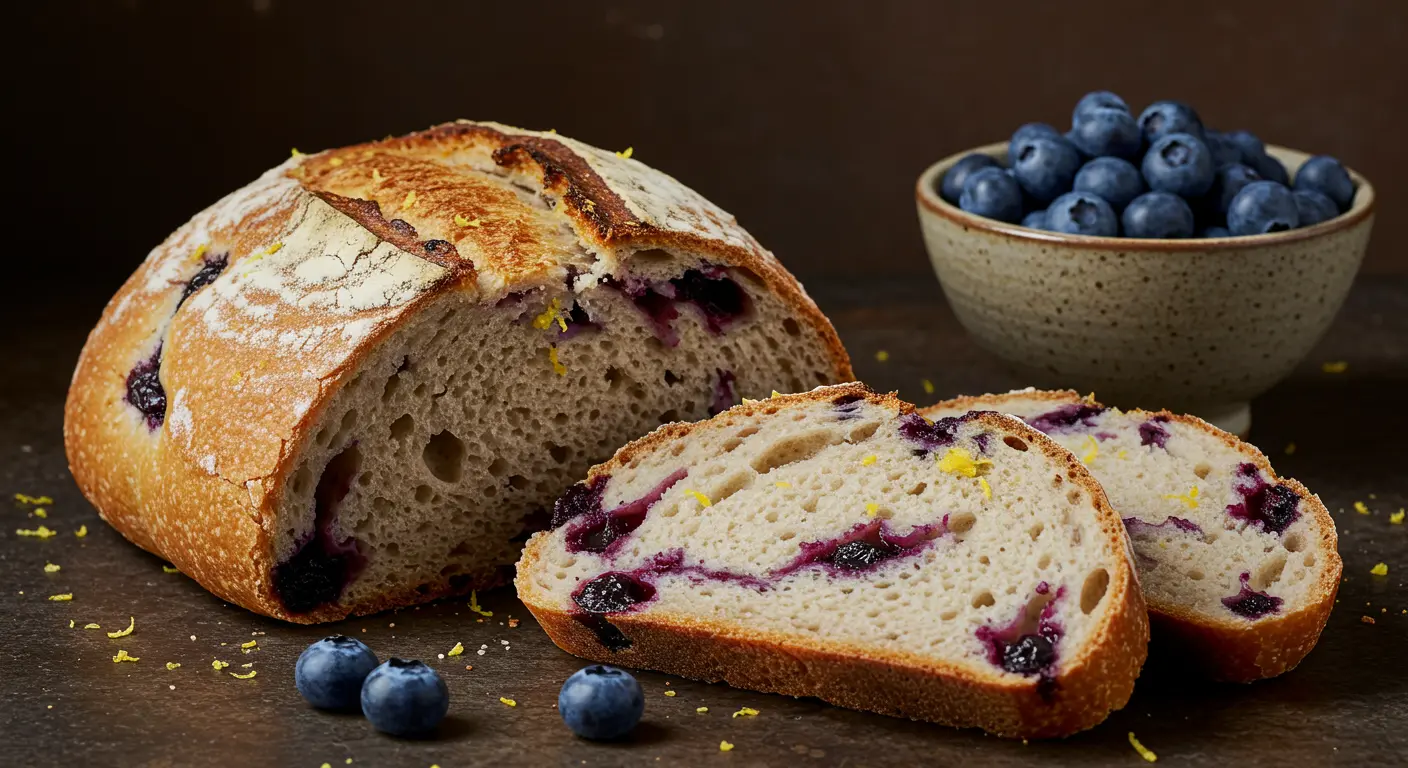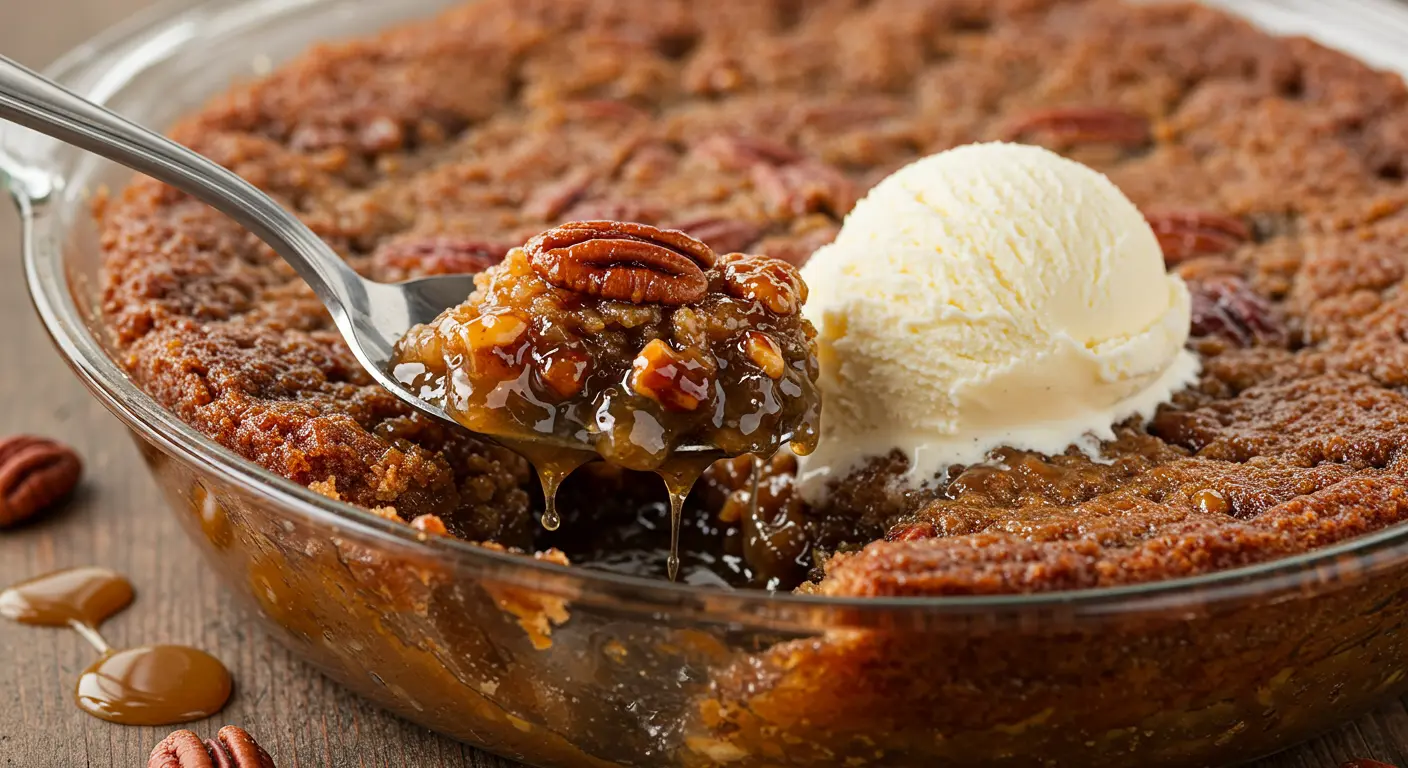As a busy mom, I know how crucial a good sandwich bread recipe is. The smell of fresh bread in the kitchen is amazing. It’s even better when you make it yourself. That’s why I’m excited to share my perfect homemade sandwich bread recipe with you.
This recipe is easy to follow and makes a soft, fluffy loaf. It’s perfect for sandwiches and toast. You’ll love it.
This recipe is a game-changer for those who love homemade bread but don’t want to spend a lot of time. With just a few ingredients and some time, you can make a soft, fluffy loaf. It’s great for both seasoned bakers and beginners.
Why This Homemade Bread Recipe Is Special
Making your own homemade sandwich bread is rewarding. This recipe is simple and consistent. It uses basic ingredients found in most kitchens, making just one loaf. This is great for small families or those who want to cut down on food waste.
Compared to store-bought bread, this homemade one loaf white bread tastes better and feels softer. You’ll wonder why you didn’t make your own bread sooner.
What Makes It Different
This homemade sandwich bread recipe is easy to follow. It doesn’t need special equipment or hard techniques. This makes it perfect for bakers of all levels.
The dough comes together fast. You can enjoy homemade bread quickly, without much hassle.
Key Benefits
- Uses simple, everyday ingredients you likely already have on hand
- Produces a single loaf, preventing unnecessary waste
- It offers a taste and texture that surpasses any store-bought alternative.
- Your home will be filled with the comforting scent of warm, fresh bread.
- Provides a sense of accomplishment and pride in your baking skills
Recipe Overview
This homemade sandwich bread recipe takes about 2 hours to prepare and bake. It makes just one loaf. The dough is made with flour, yeast, water, and a few other simple ingredients.
This results in a soft, pillowy texture. Enjoy it as a sandwich base, toasted with butter, or simply on its own.
Essential Ingredients for Perfect Sandwich Bread
Making the perfect homemade sandwich bread is all about the right ingredients. From the flour to the yeast, each part is key for a soft, tasty loaf. Let’s look at what makes this bread recipe stand out.
Flour Power
Use all-purpose flour or high-quality bread flour like King Arthur Unbleached All-Purpose Flour. It gives the bread structure and tenderness. The flour’s protein is what makes the bread rise and feel soft.
Yeast for Rise
Active dry yeast or instant yeast work well for sandwich bread. These tiny fungi eat the bread’s sugars, making bubbles that make the dough rise. This creates a soft, airy texture.
Sweetening the Deal
A little sugar adds flavor and feeds the yeast, helping the dough rise. Salt is also important for balancing the taste.
Fats for Tenderness
Butter or oil make the bread soft and rich. Milk or dairy alternatives can also add to the flavor and texture.
| Ingredient | Amount | Purpose |
|---|---|---|
| All-purpose Flour or Bread Flour | 3 1/2 cups (420g) | Provides structure and texture |
| Instant Yeast | 2 1/2 teaspoons (7g) | Rises the dough |
| Granulated Sugar | 2 tablespoons (25g) | Feeds the yeast and enhances flavor |
| Salt | 1 teaspoon (6g) | Balances flavors |
| Butter or Olive Oil | 4 tablespoons (57g) | Contributes to softness and richness |
| Milk or Dairy Alternative | 1/2 cup (120ml) | Enhances flavor and texture |
| Warm Water | 1/2 to 2/3 cup (120-160ml) | Activates the yeast |
With these ingredients on hand, you’re set to create the ultimate homemade sandwich bread. It will satisfy your cravings and delight your taste buds.
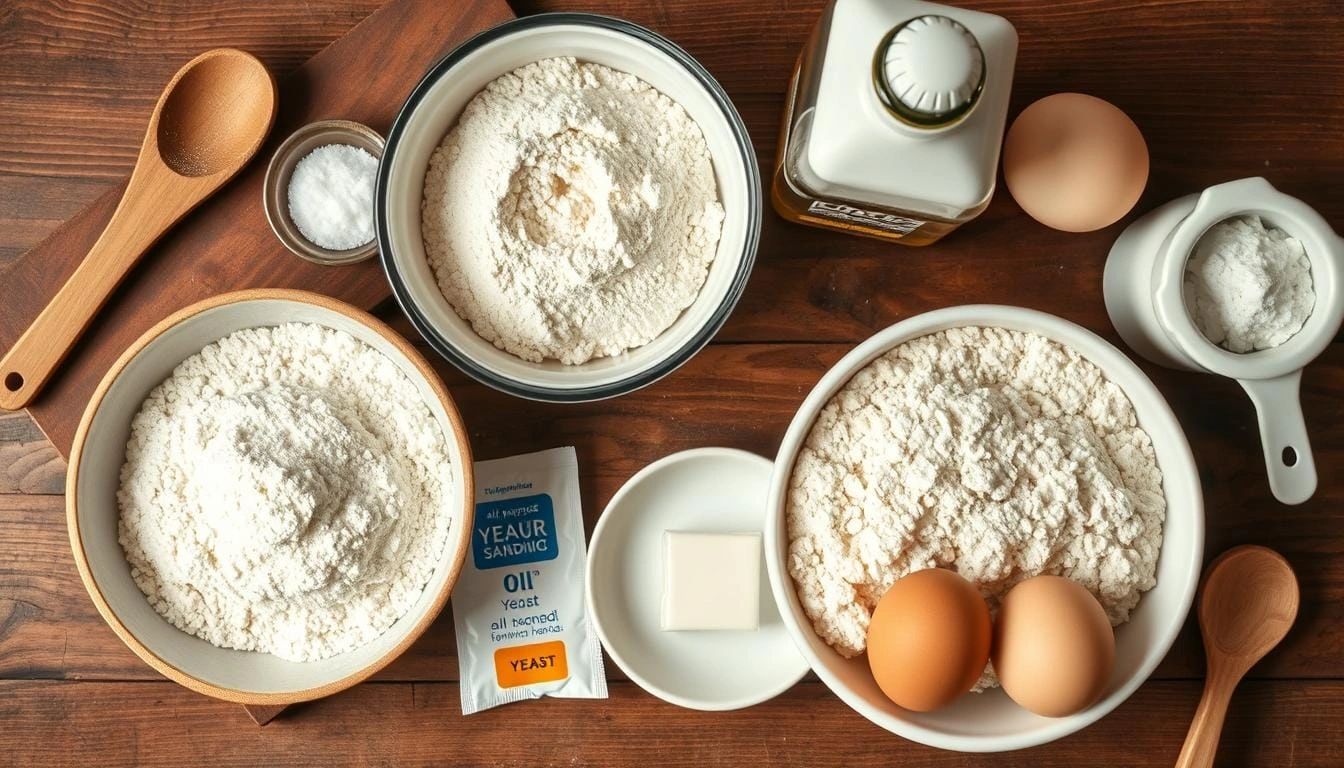
Required Kitchen Tools and Equipment
Baking homemade sandwich bread needs a few key tools and equipment. This ensures a smooth and successful process. Let’s look at the must-have items and some optional tools that can enhance your bread-baking experience.
Must-Have Items
- A large mixing bowl: You’ll need a spacious bowl to knead and proof the dough.
- Measuring cups and spoons: Accurate measurements are essential for the recipe’s success.
- A 9×5-inch loaf pan: This standard-sized pan will give you the perfect sandwich bread shape.
Optional But Helpful Tools
While not strictly necessary, the following tools can make your bread-baking efforts easier and more efficient:
- A stand mixer with a dough hook attachment: This will knead the dough for you, saving time and effort.
- A dough scraper: This handy tool can help you divide the dough and transfer it to the loaf pan.
- A kitchen scale: Weighing ingredients, especially flour, can provide more consistent results.
Bread Pan Selection Guide
When it comes to the bread pan, it’s best to opt for a metal loaf pan over glass or ceramic options. Metal pans are known to distribute heat more evenly. This results in a perfectly baked sandwich bread with a beautiful golden crust.
Remember, the right tools and equipment can make all the difference in your homemade bread-baking journey. By investing in these essentials, you’ll be well on your way to creating delicious, soft, and mouthwatering sandwich bread right in your own kitchen.
Sandwich Bread Recipe: Step-by-Step Instructions
Baking your own sandwich bread is both a fun and satisfying experience. It fills your home with the smell of fresh bread. Follow these steps to make a soft, tasty loaf that will make your sandwiches better.
- Begin by waking up the yeast. Mix lukewarm water, instant yeast, and honey in a big bowl. Wait 5-10 minutes for the yeast to get foamy and active.
- Next, mix the all-purpose flour and salt in another bowl. Add this mix to the yeast mixture slowly. Keep mixing until you get a shaggy dough.
- Put the dough on a floured surface and knead for 8-10 minutes. It should be thin and look like a window without tearing.
- Put the dough in a greased bowl, cover it, and let it rise in a warm spot for 1-2 hours. It should double in size.
- Gently deflate the dough to release air bubbles, shape it into a rectangle, and transfer it to a greased loaf pan.
- Cover the pan and let the dough rise again for 30-60 minutes. It should almost double in size.
- Heat your oven to 400°F (200°C). Brush the dough’s top with an egg wash for a shiny crust if you want.
- Bake the bread for 25-35 minutes. It should be golden brown on top and have an internal temperature of 205-210°F (96-99°C).
- Take the bread out of the oven and let it cool on a wire rack for at least 10 minutes. Then, slice and serve.
With this guide, you can make the perfect homemade sandwich bread recipe. It will be soft, fluffy, and ready for your favorite sandwiches. Enjoy baking your own bread making steps from scratch!
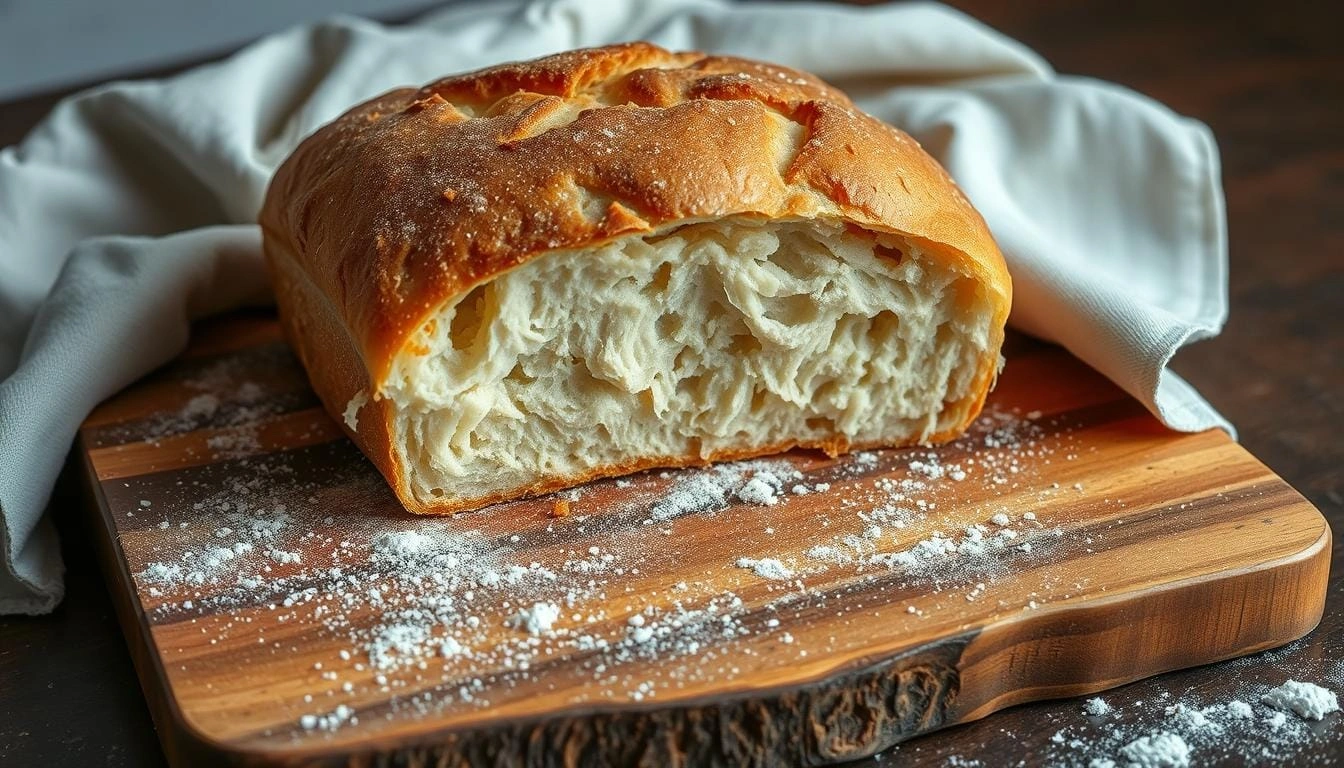
Mastering the Dough Preparation
Making the perfect homemade sandwich bread begins with the dough preparation. It involves bread dough kneading and dough rising tips. Each step is key to getting the right texture and rise.
Proper Kneading Techniques
Kneading the dough is crucial, whether by hand or with a stand mixer. For hand kneading, push the dough away with your heel, then fold it back. Do this for 5-10 minutes until it’s smooth and elastic. With a stand mixer, start slow and go up to medium speed. Knead for 5-7 minutes until it’s stretchy.
Rising and Proofing Tips
Creating the best environment for rising is key. Put the dough in a lightly oiled, covered bowl. Let it rise in a warm (75-85°F) and draft-free spot for 1-2 hours. For the second rise, gently shape the dough and let it proof for 30 minutes before baking.
Temperature Control Essentials
Keeping the right temperatures is vital. Make sure your ingredients, especially water, are lukewarm (105-115°F) for yeast activation. Keep an eye on the temperature during rising and proofing to ensure the best conditions.
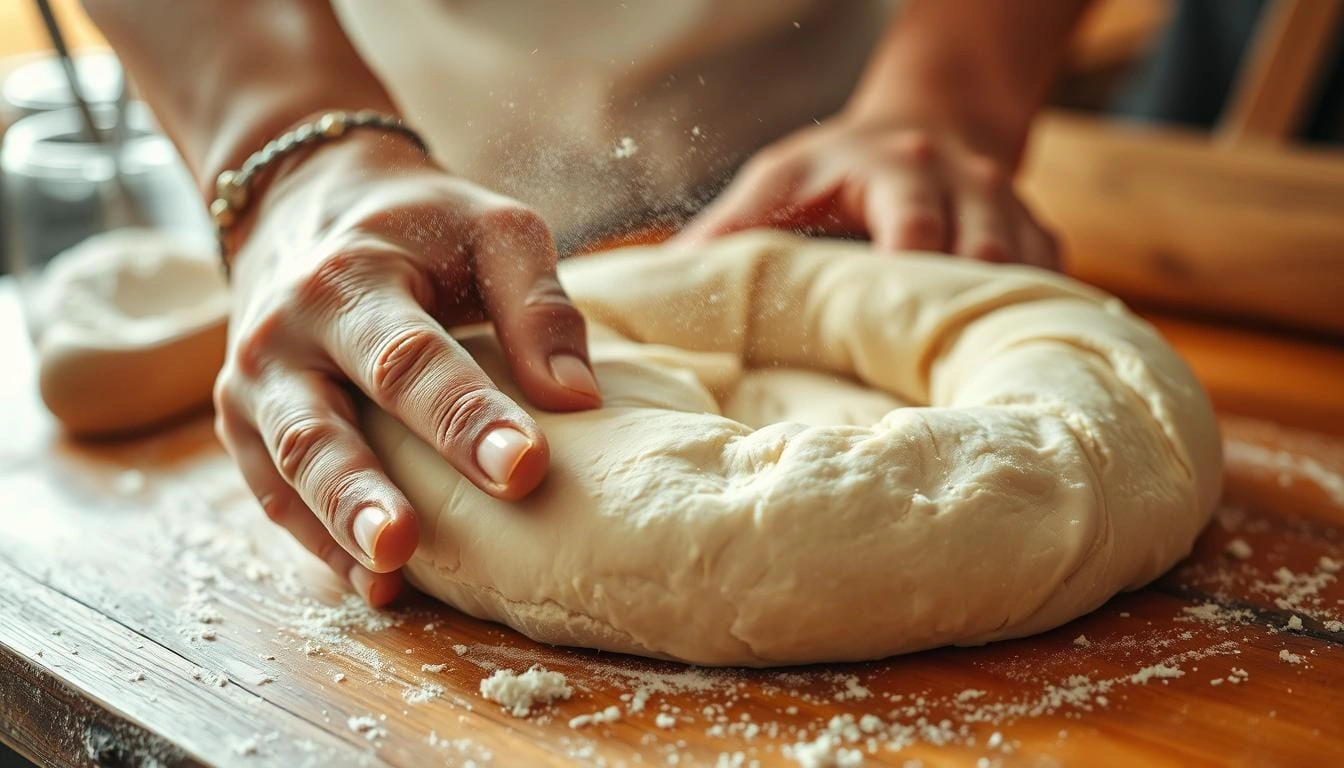
Mastering bread dough kneading and dough rising tips will help you make perfect homemade sandwich bread every time.
Baking Tips for Perfect Results
Getting perfect homemade bread is more than just a recipe. To make your sandwich bread soft, fluffy, and golden, follow these bread baking tips and homemade bread techniques.
Start by preheating your oven to 350°F to 375°F. Use an oven thermometer to check the temperature. This is key for the baking process and final look. Place the bread pan in the oven’s center for even heat.
Creating steam in the oven is vital for a crispy crust. Place a shallow baking pan with hot water on the bottom rack for the first 10-15 minutes. This steam helps the bread rise and gives it a glossy look.
To check if your bread is done, use a digital food thermometer. The internal temperature of the bread should reach between 190°F and 200°F for perfect results.
You can also tap the bread’s top. If it sounds hollow, it’s ready.
Let the loaf cool completely on a wire rack before slicing to maintain its texture. This step helps the interior cook fully and prevents it from becoming dense or gummy. With these bread baking tips and homemade bread techniques, you’ll make perfect homemade sandwich bread every time.
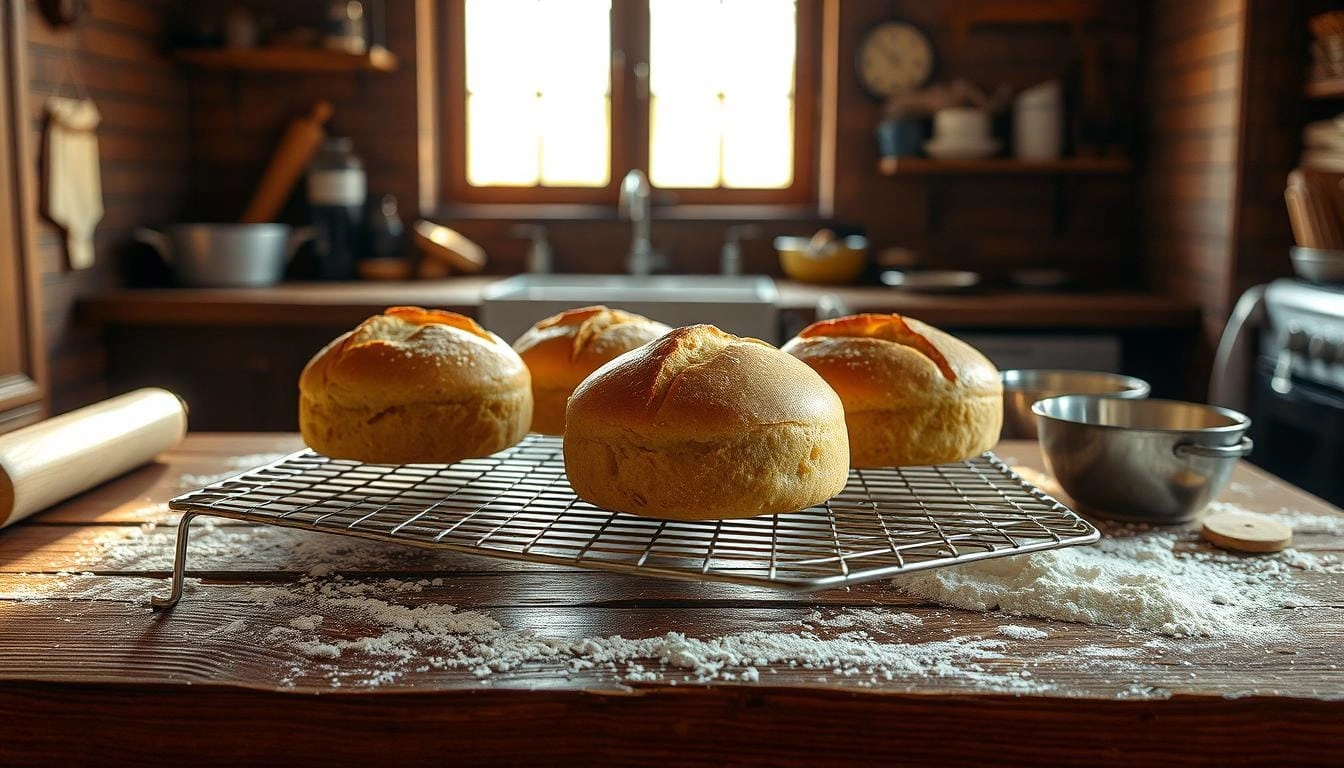
Storage and Freshness Guidelines
Keeping your homemade sandwich bread fresh is crucial. This ensures you can enjoy its soft, delicious texture for days. Follow these simple storage and freezing tips to keep your bread at its best.
Room Temperature Storage
The best way to store your freshly baked homemade sandwich bread is at room temperature. Store the bread in a paper bag or bread box to keep it fresh and soft for up to three days. Avoid storing it in the refrigerator, as the cold, dry air can cause the bread to stale faster.
Freezing Instructions
For longer-term storage, freezing sandwich bread is an excellent option. You can freeze the entire loaf or slice it first and then freeze the individual slices. Wrap the bread tightly in plastic wrap or place it in a resealable freezer bag, removing as much air as possible. Frozen bread will maintain its freshness for up to 1 month.
To enjoy frozen bread, thaw it at room temperature for the best texture. You can also refresh the texture by placing the slices in a toaster or oven for a few minutes.
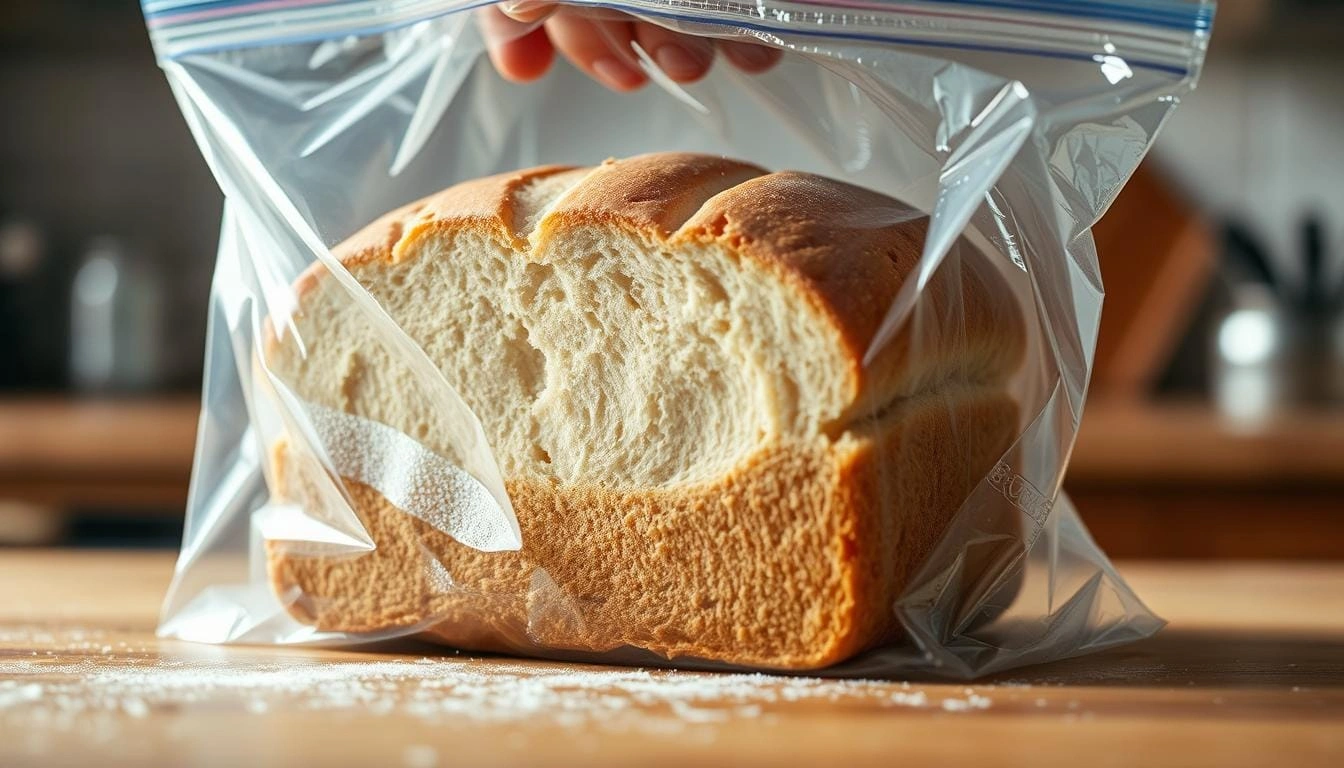
Remember, proper storage is key to keeping your homemade sandwich bread fresh and delicious. By following these guidelines, you can enjoy the fruits of your baking labor for days to come.
Common Mistakes to Avoid
Baking bread at home is a rewarding experience but can come with its own set of challenges. Knowing common mistakes helps avoid dense, unappealing loaves. By tackling these issues, you can achieve perfectly baked bread every time.
Yeast freshness is key to successful bread baking. Old or inactive yeast can stop dough from rising, making it dense. Always check yeast expiration dates and test its viability before adding it to your recipe.
- Overproofing the dough is another common mistake. Letting it rise too long can make it flat and soft. Watch rising times and punch down the dough before the second rise.
- Over-kneading can also ruin your bread. Over-kneading can result in a dense, chewy texture. Aim for 8-10 minutes of kneading until the dough is smooth and elastic.
- Choosing the right flour type is crucial. Using the wrong flour can affect your bread’s structure and rise. Make sure to use the correct type for your recipe.
By avoiding these common mistakes, you’ll make delicious homemade sandwich bread. Baking is a learning journey. Don’t be afraid to try new things and learn from your mistakes.
“The secret to exceptional bread lies not only in the recipe but also in understanding the process and learning through experience.”
Conclusion
Congratulations! You’ve started a journey to baking success with this homemade sandwich bread recipe. Making your own bread offers many benefits. You get to enjoy the taste and control over what goes into it. Plus, there’s the joy of creating something delicious from scratch.
This recipe is great for both seasoned bakers and beginners. It gives you the tools and techniques to make perfect soft, fluffy sandwich bread. You now know how to prepare the dough, bake it, and store it. This means you can try new things and make homemade bread a part of your cooking routine.
Keep practicing, and you’ll get better at baking bread. Don’t be afraid to try new things, like different flours or techniques. Enjoy the process, the smell of the bread, and the satisfaction of making something yourself. Happy baking!


